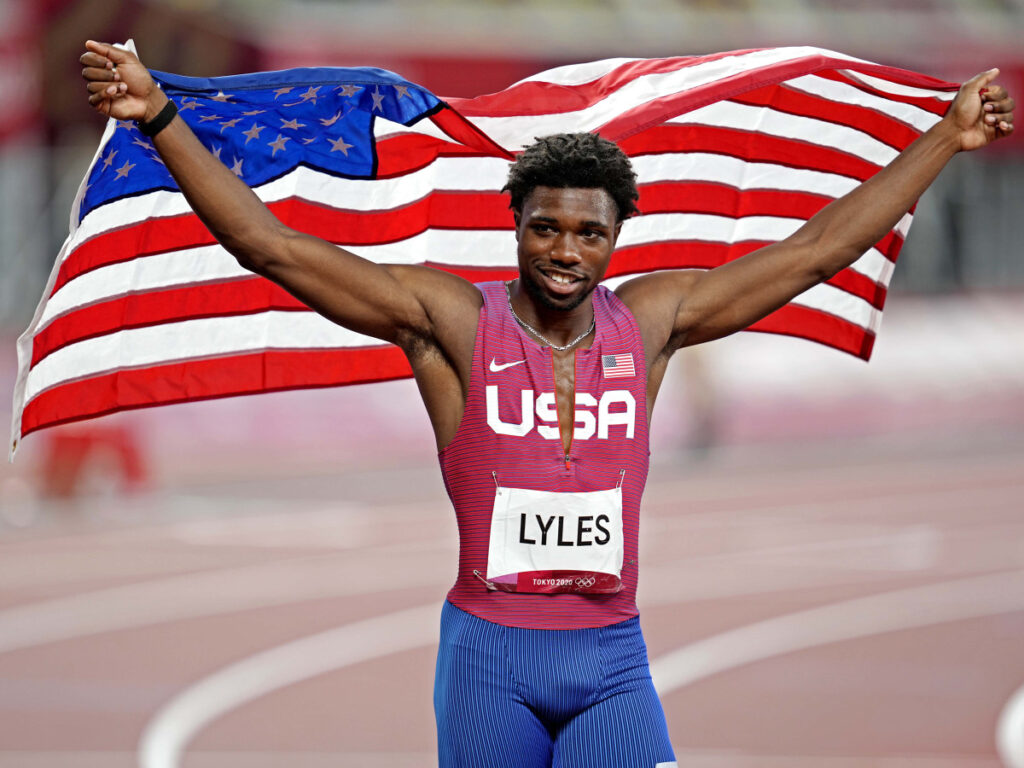
Noah Lyles, widely celebrated as the Fastest Man Alive, faced an unexpected challenge in the semifinals of the men’s 200 meters at the 2024 Summer Olympics in Paris. Despite his impressive victory in the 100 meters, where he won by an incredibly narrow margin of five thousandths of a second, Lyles did not dominate his 200-meter semifinal. Instead, Letsile Tebogo of Botswana outpaced him, finishing with a time of 19.96 seconds, just 0.12 seconds ahead of Lyles.
Lyles, known for his charisma and showmanship, had not lost a 200-meter race in three years prior to this event. His defeat in the semifinal marked a surprising end to his streak. Nonetheless, Lyles secured a spot in the final, where he will face Tebogo again for the gold medal.
Achieving gold medals in both the 100 and 200 meters at the same Olympics is a rare and prestigious feat. Usain Bolt achieved this double at three consecutive Olympics (2008, 2012, and 2016), and Carl Lewis last accomplished it in 1984. The challenge for Lyles will be to join these legendary sprinters by winning the 200 meters after his close contest in the semifinal.
In his semifinal heat, Lyles’s performance was not as commanding as expected. He seemed to struggle compared to his usual dominance, raising questions about his current form and focus. Lyles, who is 27 years old and hails from Florida, skipped the media interviews after the race and was seen heading to the medical tent, although his coach assured that he is fine.
The drama surrounding the semifinals has added an extra layer of excitement to the final. Lyles’s U.S. teammate, Kenny Bednarek, who won his own semifinal heat in 20.00 seconds, will also be competing for a medal. Bednarek’s time was the second-fastest of the evening, adding to the competitive edge of the final.
Another notable competitor is Erriyon Knighton, a 20-year-old American who has previously been a significant threat to Lyles. Knighton has defeated Lyles in earlier rounds of competitions, though not in the Olympics. Meanwhile, Andre De Grasse of Canada, the defending Olympic champion, did not make it past his semifinal heat, which was affected by a recurring hamstring injury and the recent controversy surrounding his American coach, Rana Reider. Reider had been placed on probation and was excluded from the Paris Games, which may have impacted De Grasse’s performance.
As the final approaches, the questions remain: Is Lyles fully prepared to reclaim his title, or will Tebogo and other contenders like Bednarek and Knighton emerge victorious? The answers will unfold as the athletes compete for the prestigious gold medal in the men’s 200 meters.
Leigh Diffey’s misstep during the men’s 100 meters final at the 2024 Paris Olympics has stirred considerable controversy. The NBC announcer, known for his work in IndyCar and as a seasoned Olympic commentator, mistakenly declared Jamaican sprinter Kishane Thompson the winner of the race, which was ultimately won by American Noah Lyles. This error, coming in such a high-stakes event, highlights the challenges and pressures faced by sports commentators in live broadcasting.
Diffey’s initial call was based on a rapid visual assessment, a risky move given the race’s photo-finish nature. In a social media post, Diffey admitted his error, explaining that his eyes and instinct led him to incorrectly name Thompson as the gold medalist. His admission of the mistake, downplaying it as a misjudgment of just five thousandths of a second, has been met with mixed reactions.
The error was significant because of the extraordinary closeness of the race. Lyles won with a time of 9.784 seconds, narrowly beating Thompson, who clocked 9.789 seconds. The margin of victory was so slim that even Lyles himself was unsure of the result until it was confirmed on the big screen. This uncertainty was exacerbated by Diffey’s premature announcement, followed by a correction once the official results were displayed.
Ato Bolden, the NBC analyst working with Diffey, also initially believed Thompson had won. Bolden’s comments and the subsequent focus on Thompson’s reaction contributed to the confusion. This shared misjudgment by both Diffey and Bolden, compounded by their initial certainty, further intensified the fallout from the error.
The race’s outcome was not just a matter of national pride but also part of Lyles’ bid to achieve a rare Olympic sprint double. Having already won the 100 meters, Lyles aimed to secure gold in the 200 meters, a feat last achieved by Usain Bolt in 2016. The mistake during the 100 meters final, therefore, overshadowed Lyles’ significant achievement and the broader narrative of his Olympic campaign.
Viewers and critics on social media were quick to react, pointing out the inaccuracy and questioning the reliability of live broadcast commentary. The incident also led NBC to adjust the broadcast replay in the United States to minimize the visibility of the error. This move has been criticized for attempting to downplay the mistake rather than addressing it openly.
Diffey’s response, emphasizing his reliance on visual cues and admitting his mistake, reflects the human element inherent in live sports broadcasting. Despite the error, he expressed enthusiasm for Lyles’ success and chose to avoid further discussion, aiming not to exacerbate the situation.
In the broader context, this incident underscores the pressures commentators face in live sports, where split-second decisions and judgments can lead to significant consequences. The reliance on instinct and immediate visual impressions can sometimes lead to errors, particularly in events decided by minimal margins.
Overall, the botched call during the 100 meters final at the Paris Olympics serves as a reminder of the high stakes involved in live sports broadcasting and the importance of accuracy in conveying the results of such closely contested events.
Noah Lyles Advances to 200-Meter Final at Paris Olympics
After clinching gold in the 100-meter dash on August 4, Noah Lyles of the United States returned to the track for the 200-meter competition at the 2024 Paris Olympics. The 200-meter race is Lyles’ specialty, and he entered the semifinals with strong momentum from his previous victory.
In the 200-meter semifinals, held on August 7, Lyles delivered a solid performance despite not being at his fastest. He finished second in his semifinal heat with a time of 20.08 seconds. This result was sufficient to secure an automatic qualification for the final round.
Lyles’ semifinal time was slightly behind that of Letsile Tebogo of Botswana, who won the heat with a time of 19.96 seconds. Although Lyles did not secure the top spot in the semifinal, his performance was enough to guarantee his place in the final, where the gold medal will be decided.
Lyles’ journey to the 200-meter final has been marked by resilience. Prior to his gold medal win in the 100 meters, Lyles had not secured first place in either his Round 1 or semifinal heats, demonstrating his ability to peak at the crucial moments. This characteristic will be essential as he prepares for the final, aiming to replicate his 100-meter success.
The 200-meter final promises to be a high-stakes race, with Lyles contending against a strong field. Tebogo, who beat Lyles in the semifinal, and other competitors like Erriyon Knighton and Kenneth Bednarek, will be vying for the top spot. Knighton, a rising star in sprinting, and Bednarek, who won silver in the 200 meters at the Tokyo Olympics, are expected to be key challengers.
Lyles, a showman and crowd favorite, will seek to leverage his experience and strategic acumen to secure his second gold medal of these Olympics. His ability to perform under pressure, as demonstrated in the 100 meters, will be crucial in the final.
As the final approaches, Lyles’ fans and the track and field community eagerly await whether he can achieve a rare sprint double, a feat accomplished by only a few elite sprinters in Olympic history. The outcome of the 200-meter final will not only impact Lyles’ legacy but also shape the final medal standings for the event.
